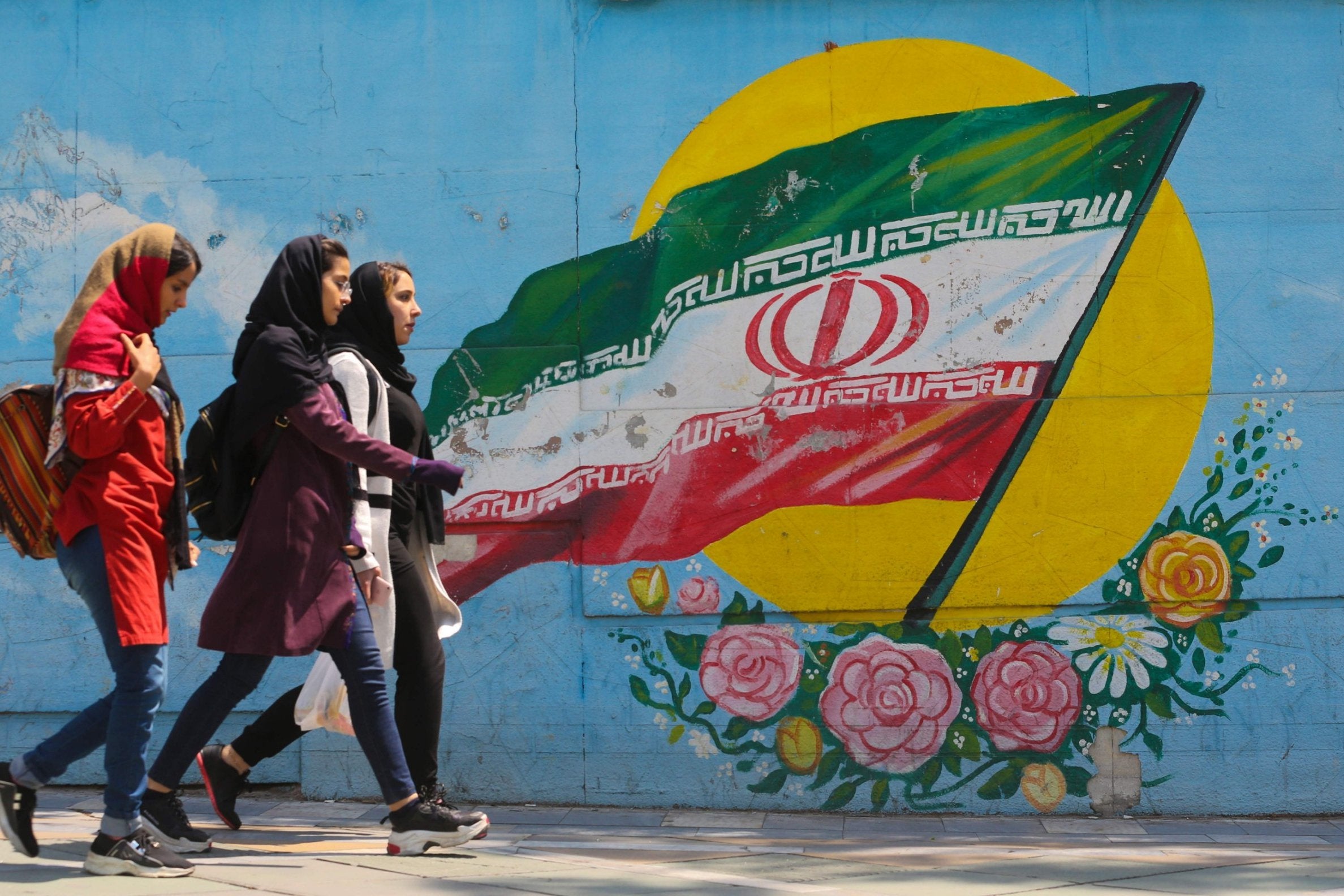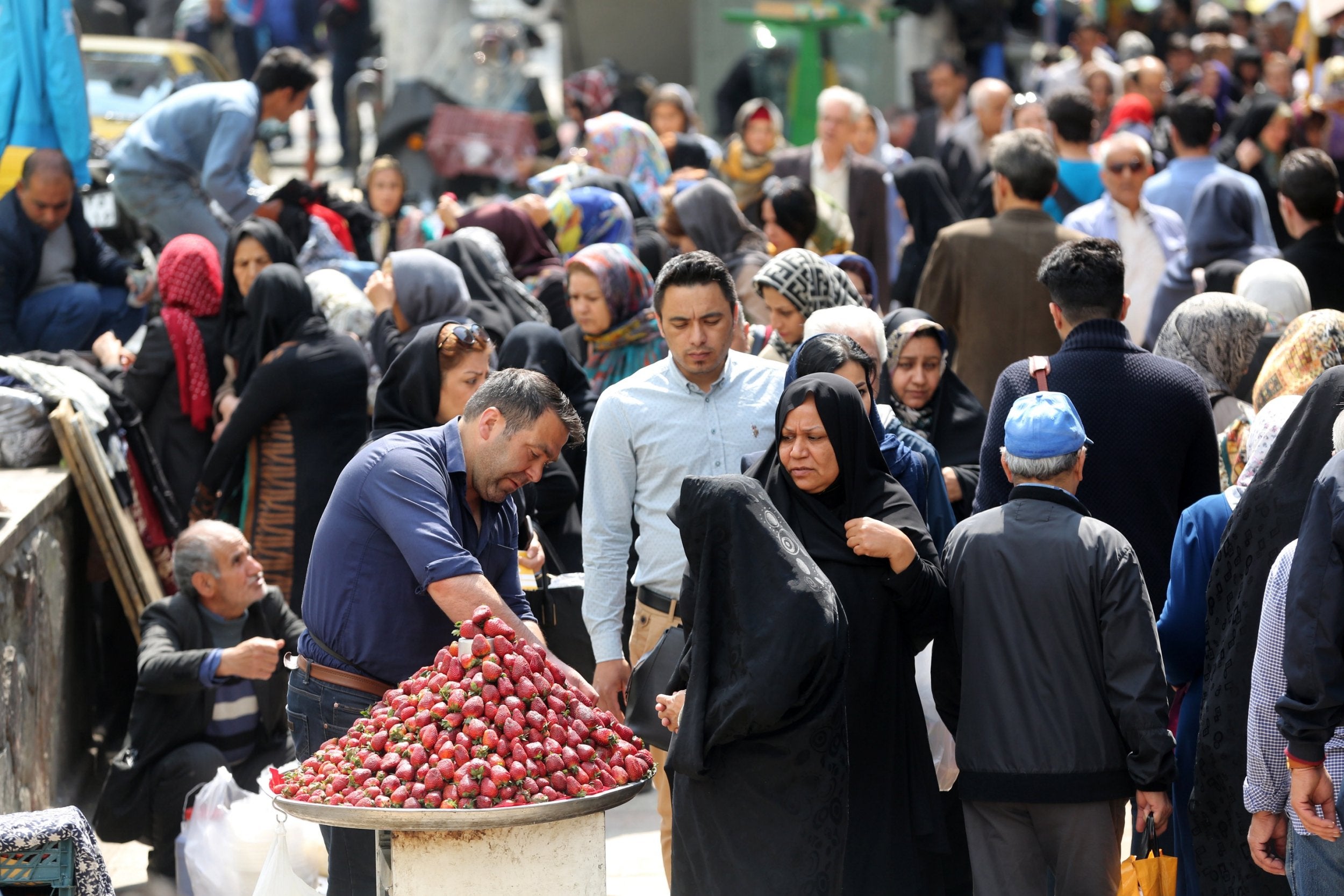Iran accuses US of 'Nazism' and 'economic terrorism' as sanctions tighten
'There is a debate inside Iran over whether to burn bridges completely by taking actions that will be hard to roll back'

Decrying what they described as “Nazism” and “economic terrorism,” Iranian authorities on Tuesday vowed to persevere in the face of Washington’s surprise decision Monday to harden punishments against countries purchasing the country’s oil.
But with its economy already in tatters as a result of sanctions, mismanagement, and natural disasters, Iran’s ability to rally international supporters and weather the fresh pressure remains in doubt.
For now, Iran is still formulating a reaction to the latest pressure by the US. But it has in the past threatened to block the strategic Strait of Hormuz through which much of the world’s oil exports transit.
“They’re not going to make a rash over-reaction to this,” said Ellie Geranmayeh, of the European Council of Foreign Relations. “They’ve already said they’re going to be in consultation with partners. It will take some time to determine how much oil Iran can sell through illicit networks or through some sort of a special state sanctioned mechanism.”
In the latest in a series of escalating measures against Iran, the administration of US President Donald Trump administration announced Monday that it would terminate sanctions waivers granted since November for eight major importers of Iranian crude oil as of 2 May.
Countries affected include China, India, Turkey, Japan, and South Korea which import about 1 million barrels a day.
“We have imposed the toughest sanctions ever on the Iranian regime,” Brian Hook, the US Special Representative for Iran, told reporters in a telephone briefing on Tuesday.
"We will continue to apply pressure until the country starts behaving more like a normal country and less like a revolutionary movement."
Iranian officials say the removal of sanctions exemptions is the latest sign that Mr Trump’s tough stance on Iran has failed.
"Escalating economic terrorism against Iranians exposes panic and desperation of US regime - and chronic failures of its client co-conspirators,” Iran's Foreign Minister Mohammad Javad Zarif wrote on Twitter on Tuesday.
“Probably the most important [security matter] is the issue of Trumpism in the world, which has characteristics similar to Nazism,” Iran’s defence minister, Brig Gen Amir Hatami said as he arrived in Moscow for a security conference.

Washington last year withdrew from the landmark 2015 nuclear deal forged by Iran and world powers and vowed to impose “maximum pressure” on Tehran to get it to scuttle its atomic infrastructure, curtail its missile programme, and halt its support for armed groups throughout the Middle East.
Though Iran’s economy has deteriorated and it faces in billions in dollars in losses from recent nationwide floods, Tehran appears no closer to changing its regional policy, scaling back its missile programme, or coming to the negotiating table to hammer out the “better deal” Mr Trump has insisted he could negotiate.
Both China and Turkey’s foreign ministries on Tuesday protested the US decision to eliminate the waiver.
"China firmly opposes implementation of US unilateral sanctions...and calls for protection of China's and international community's normal energy cooperation with Iran within the framework of international laws,” Chinese Foreign Ministry spokesperson Geng Shuang said at a briefing.
Analysts predicted both China and India would reduce Iranian oil imports but refuse to cut them off entirely in order to maintain leverage with the White House.
“Chinese and Turks have been very vociferous about opposing sanctions but that does not translate into doing anything,” said Sanam Vakil, of Chatham House.
“Every country is going to be to making its cost-benefit calculations.”
The Trump administration is loaded with ideological hardliners close to governments in Saudi Arabia, United Arab Emirates, and Israel, all of which strongly oppose what they see as Iran’s malicious regional ambitions.
Israeli Prime Minister Benjamin Netanyahu, who is close to the current White House administration, praised the removal of sanctions waiver.
The White House appears singularly obsessed with Iran, which has been a target of a tiny but influential clique of Washington policymakers and lobbyists for years.
“There was a struggle for power over this issue, with hardliners in the Trump administration coming out victorious,” said Ms Vakil. “They are thinking this is a unique moment when there’s a unified administration and allies backing the policy in the Middle East. So it’s a now-or-never moment.”
Economists predict Iran’s economy will contract 6 per cent this year, putting enormous pressure on the regime. Western interlocutors have advised Iranian officials to wait out the Trump administration and abide by the nuclear deal.
So far Iran has abided by the 2015 nuclear agreement, despite US violations of the deal. But there is pressure percolating in Tehran to act.
A number of US Democratic Party presidential candidates have vowed to bring Iran back into the nuclear deal should they beat Mr Trump for the White House in 2020.
“There are certain factions within Iran that want to wait another year,” said Ms Vakil. “There is a debate inside Iran over whether to burn bridges completely by taking actions that will be hard to roll back.”
Iran’s adherence to the deal appears to have frustrated what critics have described as an erratic and impatient White House, spurring the onslaught of sanctions and designations, including the move earlier this month to brand the entire Revolutionary Guards, a branch of the Iranian armed forces, a terrorist organisation.
There was a struggle for power over this issue, with hardliners in the Trump administration coming out victorious
Iran’s parliament on Tuesday passed a bill designating US military personnel serving in the Middle East and South Asia under Central Command a terrorist organisation and ordered the foreign and intelligence ministries to counter the US.
On Sunday, Iran’s Supreme Leader Ayatollah Ali Khamenei elevated Maj Gen Hossein Salami to commander of the Revolutionary Guard, replacing Maj Gen Mohammad Ali Jafari. The motives behind the change remain unclear.
Join our commenting forum
Join thought-provoking conversations, follow other Independent readers and see their replies
Comments
Bookmark popover
Removed from bookmarks